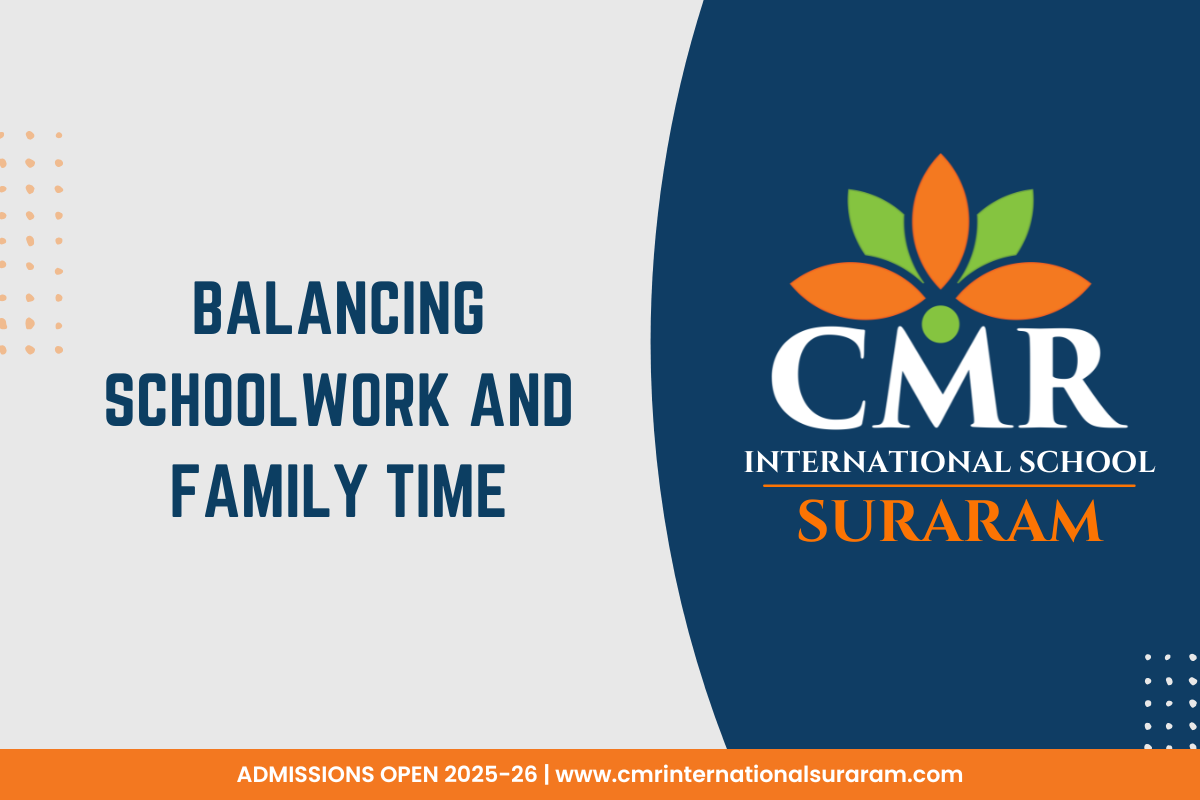Introduction
In today’s fast-paced world, families often find themselves juggling academics, extracurriculars, and home responsibilities all at once. For students, especially those in growing years, the challenge is not only to excel in school but also to enjoy meaningful family moments. Striking this balance is like walking a tightrope—you need focus, patience, and the right support system. At CMRIS, widely recognized as the Best School in Suraram, we believe that education isn’t only about grades, but about building a life where academics and family values go hand in hand.
1. The Importance of Balance Between School and Family
Think of life as a seesaw—if one side (school) becomes too heavy, the other side (family) feels ignored. Balance ensures that children not only excel academically but also grow emotionally, socially, and mentally. Too much focus on one area may create stress or feelings of disconnect.
2. Why Family Time Matters as Much as Schoolwork
Family time is more than just sitting together; it’s about conversations, laughter, and guidance. Research shows that children who spend quality time with their families often perform better in school because they feel supported and secure.
3. The Role of Parents in Academic Success
Parents aren’t just observers; they are active participants. When parents help children organize study schedules, encourage reading habits, or simply listen after a long day, they boost both confidence and academic performance.
4. How Schools Like CMRIS Support Holistic Growth
At CMRIS – the Best School in Suraram, we don’t see education as homework alone. Our approach includes extracurricular activities, skill development, and value-based learning. This way, students can manage both academics and family life without feeling overwhelmed.
5. The Hidden Benefits of Homework and Discussions at Home
Homework often gets a bad reputation, but when done right, it sparks meaningful discussions at home. For example, solving a science problem together can strengthen both understanding and the bond between parent and child.
6. Creating a Family Routine That Works
Consistency is key. Families that follow a set routine—like having dinner together, scheduling study hours, and setting aside time for fun—find it easier to balance schoolwork with family activities.
7. Managing Time Without Sacrificing Joy
Children don’t need to give up play to succeed in academics. Time management ensures that they can finish assignments while still enjoying sports, games, or hobbies. It’s not about working more, but about working smart.
8. Setting Realistic Expectations for Students
Sometimes, pressure from both schools and families can overwhelm students. It’s important to set achievable goals instead of expecting perfection. Encouraging progress over perfection makes children feel motivated rather than stressed.
9. The Power of Communication Between Parents and Children
Open conversations help children express their struggles and achievements. When parents listen without judgment, children feel safe sharing their worries—whether it’s about exams, friends, or personal challenges.
10. Quality Over Quantity: Making the Most of Limited Time
Even 30 minutes of genuine family interaction—such as storytelling, board games, or discussing the day—can be more impactful than hours spent together without real connection.
11. Avoiding Burnout in Students
Just like adults, students too can face burnout. Signs include fatigue, irritability, or disinterest in studies. A healthy balance of rest, family support, and school activities helps them recharge.
12. The Role of Technology in Balancing School and Home Life
While technology can distract, it can also connect families and enhance learning. Online educational tools, virtual study groups, or even family movie nights can make school and home life blend seamlessly.
13. Weekend Strategies for Bonding and Learning
Weekends shouldn’t be just about homework or chores. Families can plan activities like picnics, museum visits, or simple cooking sessions, which blend learning with fun. These moments create lasting memories.
14. Lessons from the Best School in Suraram: CMRIS Perspective
CMRIS emphasizes not only academics but also the importance of family support. With interactive projects, flexible learning methods, and parent-teacher collaboration, students learn to manage studies while still valuing family bonds. This balanced approach is what makes CMRIS a trusted choice for families.
15. Final Thoughts: Building a Strong Foundation Together
At the end of the day, balancing schoolwork and family time is about partnership—between schools, students, and families. It’s about teaching children that while academics open doors, family values build the foundation of who they are. At CMRIS, the Best School in Suraram, we believe that both should walk hand in hand to raise happy, successful individuals.
FAQs
1. Why is balancing school and family time important for students?
Because it ensures that children grow academically while also developing emotional, social, and mental well-being.
2. How can parents help children balance studies and family life?
Parents can set routines, offer encouragement, and communicate openly with children to reduce stress.
3. Does spending more time with family improve academic performance?
Yes. Supportive family environments boost confidence and help students perform better at school.
4. How does CMRIS help in maintaining this balance?
CMRIS combines academics with extracurricular activities and fosters parent-teacher collaboration, ensuring holistic student growth.
5. What simple family activities can improve balance?
Reading together, cooking, board games, outdoor walks, or simply talking about the day’s events can strengthen family ties and reduce academic stress.

